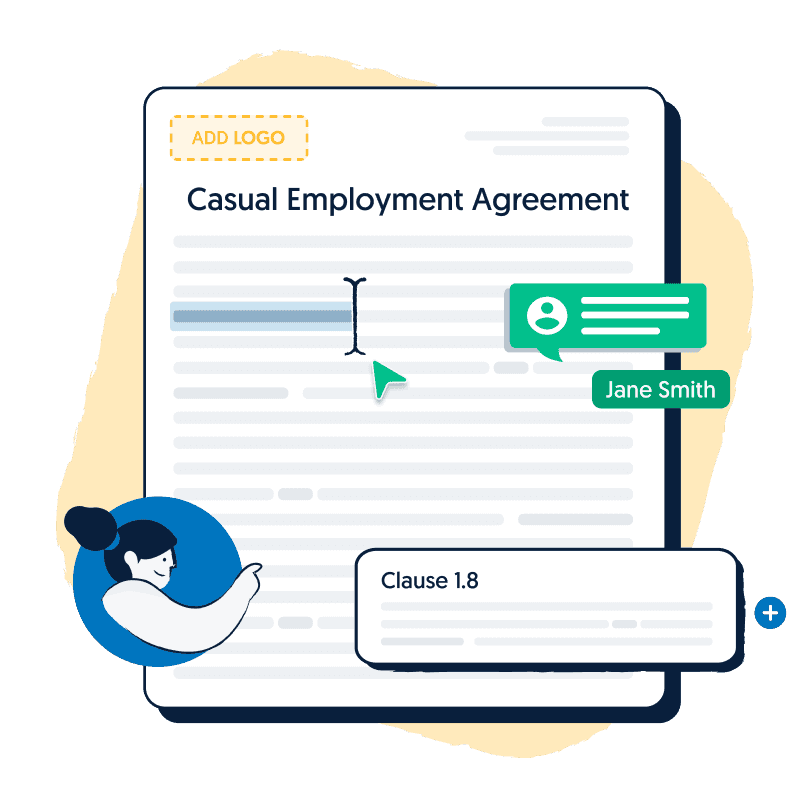Sydney-based lawyer, working in Document Automation with Lawpath. Edwin has an LLM in International Dispute Resolution (Humboldt-Universität zu Berlin), and experience in corporate law and environmental law. He is also passionate about driving transformation in legal service delivery and legal workplaces as President of The Legal Forecast NSW.
💡Key Insight
- From 26 August 2024, Australia’s casual employment laws were significantly revised so that the Fair Work Act’s definition of a casual employee now requires assessing the practical reality of the working relationship, meaning employers must consider factors such as ongoing work patterns and the right to casual loading rather than relying solely on contract wording.
- The new legislation establishes an employee choice pathway for casual employees to request conversion to permanent full-time or part-time status after a qualifying period, obliging employers to respond in writing and consult before agreeing or refusing.
- Under the updated rules, employers must provide the Casual Employment Information Statement to new casual hires and existing casuals at specified intervals, ensuring casual workers understand their rights, entitlements, and pathways to permanency.
- These changes aim to balance flexibility with job security by clarifying casual status, conversion rights, and compliance obligations, and by enabling disputes over classification or conversion to be referred to the Fair Work Commission if unresolved.
Written by
Edwin Montoya Zorrilla
Reviewed by
The Australian Government is introducing significant changes to casual employment laws, set to take effect on 26 August 2024. These changes, part of the “Closing the Loopholes” legislation, will impact the definition of casual employees, conversion rights, and employer obligations.
New Definition of Casual Employee
The new legislation redefines what constitutes a casual employee. Under the updated Fair Work Act, an employee will only be considered casual if:
- There is no firm advance commitment to continuing and indefinite work.
- The employee is entitled to receive a casual loading or specific casual pay rate.
The absence of a firm advance commitment will be determined by assessing:
- The real substance, practical reality, and true nature of the employment relationship
- Whether the employer can offer or refuse work, and the employee can accept or reject it
- The likelihood of future work availability based on the nature of the business
- The presence of full-time or part-time employees performing similar work
- Whether the employee has a regular work pattern
Casual Conversion to Permanent Employment
The legislation introduces a new pathway for eligible casual employees to convert to permanent employment.
- Employees can notify their employer of their intention to convert after 6 months of employment (12 months where the employer is a small business employer) if they believe they no longer meet the casual employee definition.
- Employers must consult with the employee and respond in writing within 21 days.
- Employers can refuse conversion if the employee still meets the definition of a casual, or certain operational reasons:
- substantial changes would be required to organisation of work in the employer’s business;
- the employer’s business would be significantly impacted; or
- the employee’s employment conditions would have to change substantially to ensure the employer doesn’t break any rules (such as in an award or agreement) that would apply to the employee.
Employers must not reduce hours, vary work patterns, or terminate employment to avoid conversion obligations. Furthermore, the right to ask for conversion is subject to the “General Protection” of the Fair Work Act, which means that the employer is restricted from taking adverse action against the employee or applying undue pressure in relation to their request.

Get your Casual Employment Agreement now for free.
Hire casual employees in any industry. This Employment Agreement (Casual) is essential when hiring new employees for your business.
Fixed-Term Contracts for Casuals
Generally, casual employees can be hired on fixed-term contracts. However, academic or higher education teaching staff who are not state public sector employees and are covered by specific awards cannot be hired on fixed-term contracts.
Penalties and Compliance
The legislation introduces new civil remedy provisions and penalties for employers who:
- Contravene FWC orders.
- Misrepresent employment as casual.
- Dismiss employees to re-engage them as casuals.
- Take steps to avoid the conversion process.
- Make false statements to persuade individuals to enter casual employment contracts.
Employers have a defense if they can demonstrate a reasonable belief that the position was casual when any misrepresentation was made.
Casuals employed before 26 August 2024
First of all, employees who were casual before 26 August 2024 will remain casual under the new definition unless they convert to permanent employment.
The way the new conversion provisions apply is as follows:
- For casuals employed before 26 August 2024, the previous conversion requirements continue to apply for 6 months, or 12 months if employed by a small business employer. Following that point, the new requirements apply.
- For casuals employed on or after 26 August 2024, the new requirements apply.
For more information on the previous requirements, see this article.
Casual Employment Information Statement (CEIS)
Employers must provide the CEIS to:
- New casual employees before or as soon as possible after starting employment
- Existing casuals in non-small business employers at 6 months, 12 months, and every subsequent 12-month period
- Existing casuals in small business employers at 12 months of employment
Dispute Resolution
If disputes arise regarding casual conversion, they can be referred to the Fair Work Commission (FWC) if not resolved at the workplace level. The FWC can facilitate conciliation or mediation, and if necessary, arbitrate the dispute.
Implications for Employers
Employers should:
- Implement processes to track casual employee tenure and eligibility for conversion.
- Be prepared to respond to conversion requests within the required timeframe.
- Ensure that the practical reality of casual employment aligns with the new definition.
- Provide the CEIS as required and maintain records of compliance.
- Train managers and HR staff on the new requirements and potential penalties.
Don't know where to start?
Contact us on 1800 529 728 to learn more about customising legal documents, obtaining a fixed-fee quote from our network of 600+ expert lawyers or to get answers to your legal questions.
Conclusion
These changes represent a significant shift in casual employment regulation in Australia. They aim to provide greater clarity on the nature of casual work and offer more pathways for casual employees to transition to permanent roles if desired. Employers must carefully navigate these new requirements to ensure compliance and avoid potential penalties. Although the obligations kick on the 26th of August 2024, employers should prepare in advance.
The new legislation balances the flexibility of casual employment with increased protections for workers. It emphasises the importance of assessing the true nature of the employment relationship beyond just contractual terms. As these changes take effect, both employers and employees should familiarise themselves with their rights and obligations under the new system.
Lawpath provides a range of employment documents to ensure that you have the right documentation that complies with legislation and reflects the nature of the employment relationship. These include:
- Employment Agreement (Casual) for casual staff.
- Full Time Employment Agreement for permanent staff.
- Letter of Casual Conversion to Part-Time or Full-Time Employment for employers who wish to or are required to make such an offer (this requirement will apply until the 26th of August).
- Casual Conversion Acceptance Letter for a subsequent acceptance by employers. Until the 26th of August 2024 this document can be used to confirm the employee’s conversion following their acceptance. Following this date, this document can be used to accept an employee’s request for casual conversion.
- Letter Informing that Employer Will Not Offer Casual Conversion. Until the 26th of August 2024 this document can be used to proactively inform the employee that they will not be offered conversion. Following this date, this document can be used to reject an employee’s request for casual conversion.
Further documents will be added on the 26th of August 2024.
Want more?
Sign up for our newsletter and be the first to find hand-picked articles on topics that we believe are crucial to successfully scale your unique small business.






